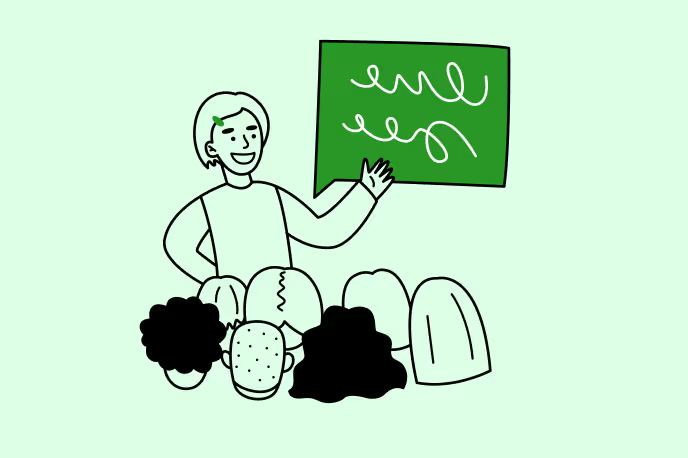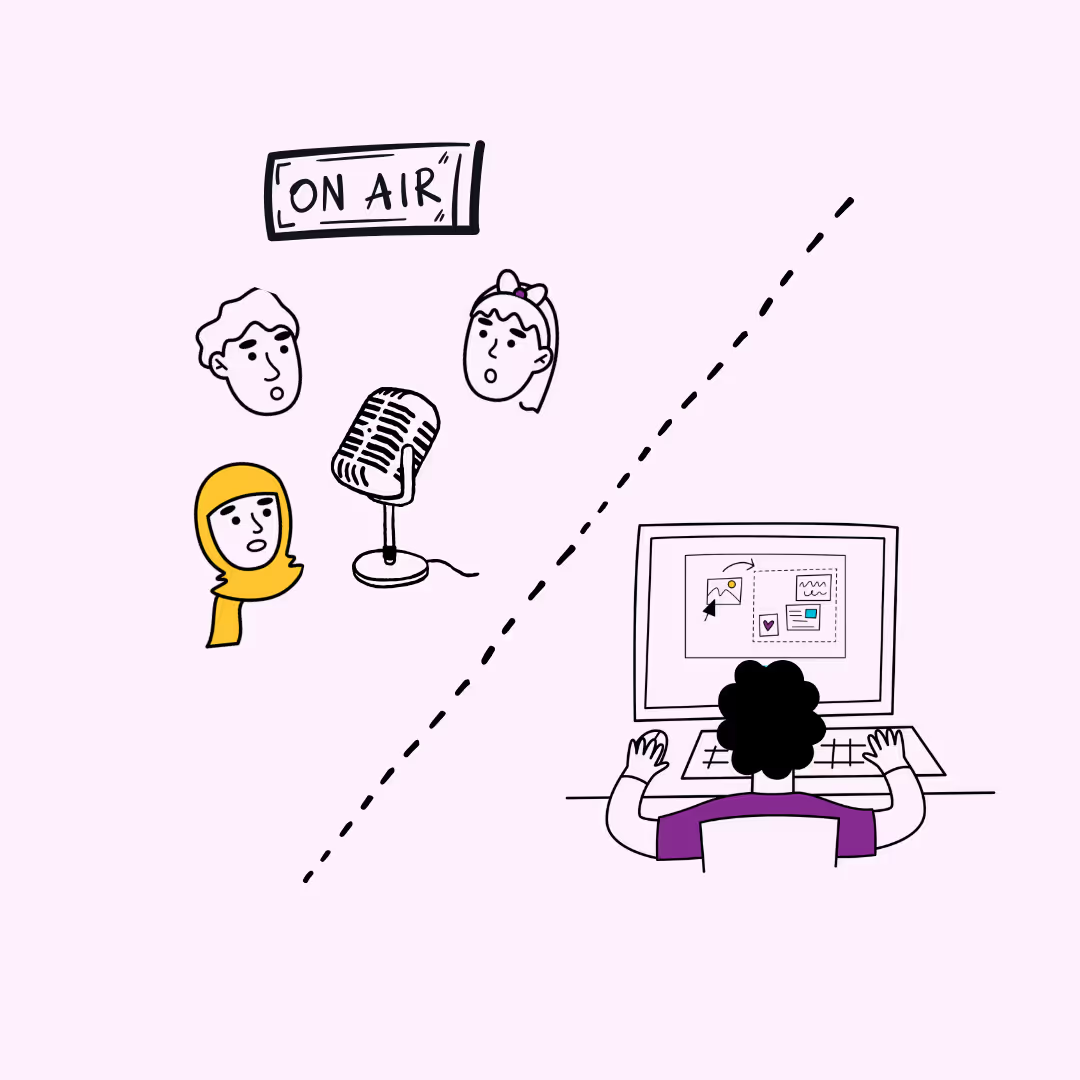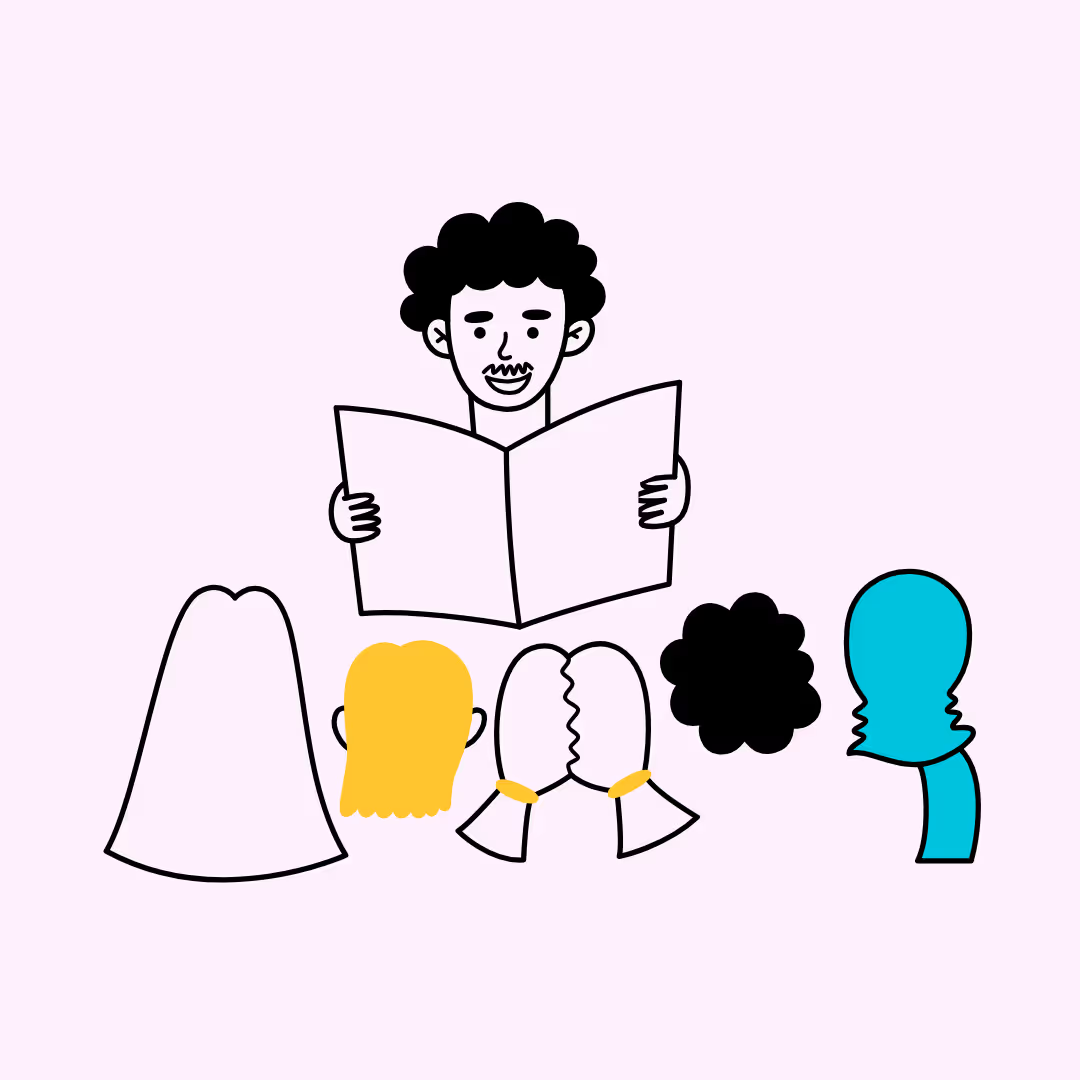Lesson plans
Our lesson plans are crafted by learning designers, professional educators, and through co-design with children and young people. We offer high-quality teaching materials that empower educators to foster digital citizenship in today's technology-driven educational landscape.

Conduct
About this Risk Area
The behaviour children and young people engage in online.
Example topics:
- Cyberbullying awareness and prevention strategies.
- Practicing kindness, empathy, and respectful communication online.
- Understanding the consequences of digital actions, including what can be deleted and what cannot be deleted.
- Respecting online community guidelines and fostering a positive online environment.
The resources for this risk area guide positive online behaviours, by promoting kindness, respect, and responsible digital citizenship.
Students use soft toys, storytelling, and crafts to explore online kindness, fostering empathy and respectful behaviour in digital interactions.
.avif)
Content
About this Risk Area
The material children may come across online, including inappropriate or harmful content.
Example topics:
- Strategies for avoidance and help-seeking in relation to problematic and/or offensive content.
- Recognising and critically analysing misinformation, fake news, and clickbait.
- Understanding the impact of online content on emotions, attitudes, and behaviours.
- Respecting intellectual property rights and understanding copyright laws.
The resources for this risk area provide guidance on navigating and critically evaluating online material.
Explore pop-up ads as a form of digital advertising through storytelling and roleplay.

Compulsion
About this Risk Area
Addresses excessive use of digital devices or online activities which can impact children's mental health, academic performance, and social relationships.
Example topics:
- Understanding the importance of balanced screen time.
- Developing healthy habits for managing digital device use and prioritising offline activities.
- Setting boundaries and practicing self-regulation when it comes to online gaming, social media, and other digital activities.
The resources for this risk area promote healthy relationships with technology and encourage positive social and emotional wellbeing.
This activity addresses issues related to technology use at school and home, promotes critical thinking about its emotional and social impact, develops self-regulation strategies, and cultivates communication skills such as active listening and empathy.

Compulsion
About this Risk Area
Addresses excessive use of digital devices or online activities which can impact children's mental health, academic performance, and social relationships.
Example topics:
- Understanding the importance of balanced screen time.
- Developing healthy habits for managing digital device use and prioritising offline activities.
- Setting boundaries and practicing self-regulation when it comes to online gaming, social media, and other digital activities.
The resources for this risk area promote healthy relationships with technology and encourage positive social and emotional wellbeing.
This activity helps students explore the emotional impacts of technology. It fosters balanced screen time and mindful online interactions.

Content
About this Risk Area
The material children may come across online, including inappropriate or harmful content.
Example topics:
- Strategies for avoidance and help-seeking in relation to problematic and/or offensive content.
- Recognising and critically analysing misinformation, fake news, and clickbait.
- Understanding the impact of online content on emotions, attitudes, and behaviours.
- Respecting intellectual property rights and understanding copyright laws.
The resources for this risk area provide guidance on navigating and critically evaluating online material.
Learners manipulate images using digital devices or traditional arts, laying the groundwork for media literacy concepts.

Conduct
About this Risk Area
The behaviour children and young people engage in online.
Example topics:
- Cyberbullying awareness and prevention strategies.
- Practicing kindness, empathy, and respectful communication online.
- Understanding the consequences of digital actions, including what can be deleted and what cannot be deleted.
- Respecting online community guidelines and fostering a positive online environment.
The resources for this risk area guide positive online behaviours, by promoting kindness, respect, and responsible digital citizenship.
This activity enhances creative writing in the English curriculum, focusing on character development, settings, and plot structures, and is relevant for students engaged in online gaming and social media, addressing respectful relationships and promoting empathy and respect in both online and offline environments.
.avif)
Conduct
About this Risk Area
The behaviour children and young people engage in online.
Example topics:
- Cyberbullying awareness and prevention strategies.
- Practicing kindness, empathy, and respectful communication online.
- Understanding the consequences of digital actions, including what can be deleted and what cannot be deleted.
- Respecting online community guidelines and fostering a positive online environment.
The resources for this risk area guide positive online behaviours, by promoting kindness, respect, and responsible digital citizenship.
Learners explore how positive behaviour—like respect, kindness, and fairness—helps create safe online spaces.

Content
About this Risk Area
The material children may come across online, including inappropriate or harmful content.
Example topics:
- Strategies for avoidance and help-seeking in relation to problematic and/or offensive content.
- Recognising and critically analysing misinformation, fake news, and clickbait.
- Understanding the impact of online content on emotions, attitudes, and behaviours.
- Respecting intellectual property rights and understanding copyright laws.
The resources for this risk area provide guidance on navigating and critically evaluating online material.
Learners explore fairness and inclusion in media, recognising diverse and respectful representation.

Compulsion
About this Risk Area
Addresses excessive use of digital devices or online activities which can impact children's mental health, academic performance, and social relationships.
Example topics:
- Understanding the importance of balanced screen time.
- Developing healthy habits for managing digital device use and prioritising offline activities.
- Setting boundaries and practicing self-regulation when it comes to online gaming, social media, and other digital activities.
The resources for this risk area promote healthy relationships with technology and encourage positive social and emotional wellbeing.
This activity introduces students to poetry, relates its key themes to their lives, addresses concerns about wellbeing and social interactions related to device usage, and encourages a balanced perspective on technology use.

Contact
About this Risk Area
When potentially harmful contact is initiated by others online, including strangers who may pose risks such as exploitation or identity theft.
Example topics:
- Online privacy and security practices, including setting strong passwords and managing privacy settings.
- Recognising and responding to online threats, such as phishing scams and identity theft.
- Establishing boundaries for online interactions and understanding the risks of sharing personal information online.
- Seeking help and reporting inappropriate or harmful online behaviour to trusted adults or authorities.
The resources for this risk area support learning in relation to safe online communication, privacy settings, and establishing boundaries for interacting with others on the internet.
In this activity, students explore problems and decisions faced online. It encourages boundary-setting, respectful interactions, and assertiveness for online safety.

Contact
About this Risk Area
When potentially harmful contact is initiated by others online, including strangers who may pose risks such as exploitation or identity theft.
Example topics:
- Online privacy and security practices, including setting strong passwords and managing privacy settings.
- Recognising and responding to online threats, such as phishing scams and identity theft.
- Establishing boundaries for online interactions and understanding the risks of sharing personal information online.
- Seeking help and reporting inappropriate or harmful online behaviour to trusted adults or authorities.
The resources for this risk area support learning in relation to safe online communication, privacy settings, and establishing boundaries for interacting with others on the internet.
Learners build critical thinking skills to recognise and respond to misinformation that is shared with them.

Conduct
About this Risk Area
The behaviour children and young people engage in online.
Example topics:
- Cyberbullying awareness and prevention strategies.
- Practicing kindness, empathy, and respectful communication online.
- Understanding the consequences of digital actions, including what can be deleted and what cannot be deleted.
- Respecting online community guidelines and fostering a positive online environment.
The resources for this risk area guide positive online behaviours, by promoting kindness, respect, and responsible digital citizenship.
Learners explore examples of online apologies, then create a personal collage with goals for good apologies.

Compulsion
About this Risk Area
Addresses excessive use of digital devices or online activities which can impact children's mental health, academic performance, and social relationships.
Example topics:
- Understanding the importance of balanced screen time.
- Developing healthy habits for managing digital device use and prioritising offline activities.
- Setting boundaries and practicing self-regulation when it comes to online gaming, social media, and other digital activities.
The resources for this risk area promote healthy relationships with technology and encourage positive social and emotional wellbeing.
Learners explore compulsion-related online safety risks by creating a podcast or fact sheet that encourages balanced digital habits.
.avif)
Conduct
About this Risk Area
The behaviour children and young people engage in online.
Example topics:
- Cyberbullying awareness and prevention strategies.
- Practicing kindness, empathy, and respectful communication online.
- Understanding the consequences of digital actions, including what can be deleted and what cannot be deleted.
- Respecting online community guidelines and fostering a positive online environment.
The resources for this risk area guide positive online behaviours, by promoting kindness, respect, and responsible digital citizenship.
Empowering learners to explore online conduct risks through podcast creation or fact sheet design.
.avif)
Contact
About this Risk Area
When potentially harmful contact is initiated by others online, including strangers who may pose risks such as exploitation or identity theft.
Example topics:
- Online privacy and security practices, including setting strong passwords and managing privacy settings.
- Recognising and responding to online threats, such as phishing scams and identity theft.
- Establishing boundaries for online interactions and understanding the risks of sharing personal information online.
- Seeking help and reporting inappropriate or harmful online behaviour to trusted adults or authorities.
The resources for this risk area support learning in relation to safe online communication, privacy settings, and establishing boundaries for interacting with others on the internet.
Learners explore contact risks by creating a podcast or fact sheet, building skills to stay safe when connecting with others online.
.avif)
Content
About this Risk Area
The material children may come across online, including inappropriate or harmful content.
Example topics:
- Strategies for avoidance and help-seeking in relation to problematic and/or offensive content.
- Recognising and critically analysing misinformation, fake news, and clickbait.
- Understanding the impact of online content on emotions, attitudes, and behaviours.
- Respecting intellectual property rights and understanding copyright laws.
The resources for this risk area provide guidance on navigating and critically evaluating online material.
Empowering learners to explore online content risks through podcast creation or fact sheet design.

Content
About this Risk Area
The material children may come across online, including inappropriate or harmful content.
Example topics:
- Strategies for avoidance and help-seeking in relation to problematic and/or offensive content.
- Recognising and critically analysing misinformation, fake news, and clickbait.
- Understanding the impact of online content on emotions, attitudes, and behaviours.
- Respecting intellectual property rights and understanding copyright laws.
The resources for this risk area provide guidance on navigating and critically evaluating online material.
Students craft protection brews against scary content, fostering media literacy through creative arts.

Content
About this Risk Area
The material children may come across online, including inappropriate or harmful content.
Example topics:
- Strategies for avoidance and help-seeking in relation to problematic and/or offensive content.
- Recognising and critically analysing misinformation, fake news, and clickbait.
- Understanding the impact of online content on emotions, attitudes, and behaviours.
- Respecting intellectual property rights and understanding copyright laws.
The resources for this risk area provide guidance on navigating and critically evaluating online material.
This hands-on activity explores AI-generated images and ethical considerations, teaching students media literacy skills to distinguish between AI and human-created media while creating their own AI images.

Compulsion
About this Risk Area
Addresses excessive use of digital devices or online activities which can impact children's mental health, academic performance, and social relationships.
Example topics:
- Understanding the importance of balanced screen time.
- Developing healthy habits for managing digital device use and prioritising offline activities.
- Setting boundaries and practicing self-regulation when it comes to online gaming, social media, and other digital activities.
The resources for this risk area promote healthy relationships with technology and encourage positive social and emotional wellbeing.
Read the free eBook "Brick Needs a Break", a winning entry from the Series 1 Stories by Digital Children competition.

Compulsion
About this Risk Area
Addresses excessive use of digital devices or online activities which can impact children's mental health, academic performance, and social relationships.
Example topics:
- Understanding the importance of balanced screen time.
- Developing healthy habits for managing digital device use and prioritising offline activities.
- Setting boundaries and practicing self-regulation when it comes to online gaming, social media, and other digital activities.
The resources for this risk area promote healthy relationships with technology and encourage positive social and emotional wellbeing.
Students explore the importance of balanced digital device usage and encourages face-to-face social interactions.

Contact
About this Risk Area
When potentially harmful contact is initiated by others online, including strangers who may pose risks such as exploitation or identity theft.
Example topics:
- Online privacy and security practices, including setting strong passwords and managing privacy settings.
- Recognising and responding to online threats, such as phishing scams and identity theft.
- Establishing boundaries for online interactions and understanding the risks of sharing personal information online.
- Seeking help and reporting inappropriate or harmful online behaviour to trusted adults or authorities.
The resources for this risk area support learning in relation to safe online communication, privacy settings, and establishing boundaries for interacting with others on the internet.
Students learn online safety through 'Swoosh, Glide, and Rule Number 5' story time, addressing internet use with family and friends.

Contact
About this Risk Area
When potentially harmful contact is initiated by others online, including strangers who may pose risks such as exploitation or identity theft.
Example topics:
- Online privacy and security practices, including setting strong passwords and managing privacy settings.
- Recognising and responding to online threats, such as phishing scams and identity theft.
- Establishing boundaries for online interactions and understanding the risks of sharing personal information online.
- Seeking help and reporting inappropriate or harmful online behaviour to trusted adults or authorities.
The resources for this risk area support learning in relation to safe online communication, privacy settings, and establishing boundaries for interacting with others on the internet.
This activity is relevant for students engaging in online activities such as gaming, social media, or messaging services, helping them identify when to seek support before sharing personal information, expanding their understanding of hacking and its impacts.

Contact
About this Risk Area
When potentially harmful contact is initiated by others online, including strangers who may pose risks such as exploitation or identity theft.
Example topics:
- Online privacy and security practices, including setting strong passwords and managing privacy settings.
- Recognising and responding to online threats, such as phishing scams and identity theft.
- Establishing boundaries for online interactions and understanding the risks of sharing personal information online.
- Seeking help and reporting inappropriate or harmful online behaviour to trusted adults or authorities.
The resources for this risk area support learning in relation to safe online communication, privacy settings, and establishing boundaries for interacting with others on the internet.
This game promotes discussions about online safety, encouraging cooperation while learning to protect their personal information.

Conduct
About this Risk Area
The behaviour children and young people engage in online.
Example topics:
- Cyberbullying awareness and prevention strategies.
- Practicing kindness, empathy, and respectful communication online.
- Understanding the consequences of digital actions, including what can be deleted and what cannot be deleted.
- Respecting online community guidelines and fostering a positive online environment.
The resources for this risk area guide positive online behaviours, by promoting kindness, respect, and responsible digital citizenship.
Students practice saying 'no' in online scenarios, fostering confidence and assertiveness to set personal boundaries safely.
.avif)
Compulsion
About this Risk Area
Addresses excessive use of digital devices or online activities which can impact children's mental health, academic performance, and social relationships.
Example topics:
- Understanding the importance of balanced screen time.
- Developing healthy habits for managing digital device use and prioritising offline activities.
- Setting boundaries and practicing self-regulation when it comes to online gaming, social media, and other digital activities.
The resources for this risk area promote healthy relationships with technology and encourage positive social and emotional wellbeing.
Learners reflect on how online content affects their wellbeing, building habits to support emotional safety.

